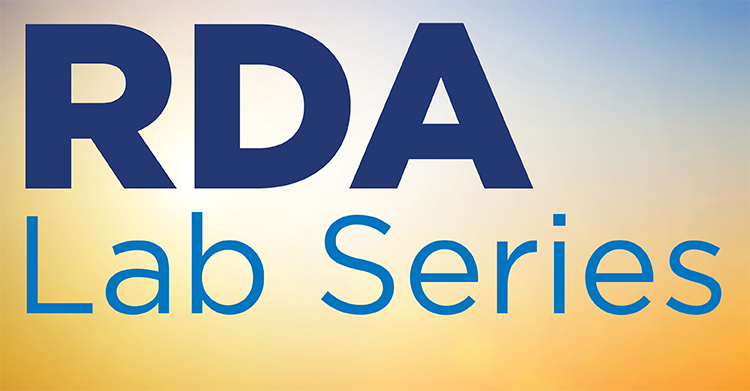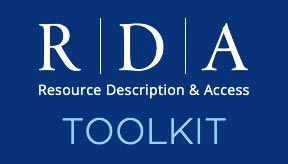RDA Lab Series returns in 2022

This year's RDA Lab Series will consist of six modules, each consisting of four 60-minute sessions. Sessions will take place on Thursdays at 12:00pm Eastern/11:00am Central/10:00am Mountain/9:00am Pacific starting on April 28, 2022.
The RDA Lab Series is designed to help participants understand how to apply the new RDA and RDA Toolkit created by the 3R Project. This series will provide hands-on experience using the new RDA and RDA Toolkit with an RDA Lab application profile.
This series of webinars explores concepts introduced by the IFLA Library Reference Model (LRM), such as the Nomen entity and aggregate manifestations. The series will also address new approaches to familiar topics such as relationships and persons. The focus is practical, not conceptual, giving participants strategies for implementing the updated RDA in their agencies.
In each module, cataloging expert and former RDA Steering Committee member Kate James guides participants through the structure and content of the new RDA Toolkit by using exercises based on regular cataloging situations. Each module consists of four sessions. The first session in each module provides registrants with an overview of the topic and a brief explanation of the application profile(s) used. The other sessions consist of instructor demonstrations of exercises and a Q and A period. Registrants will be given exercises for the session in advance but are not expected to submit exercises to the instructor.
General knowledge and familiarity with current RDA cataloging practices and concepts is assumed. Registration is also available for each module separately.
Modules included in this series:
This module provides exposure to a variety of aspects of relationship elements, which are used to describe entities. Topics covered in the module include element labels, domain and range, element hierarchies, coherent description of an information resource, and recording methods.
This module will demystify this entity, demonstrating how other entities are identified by their relationships to nomens, and how nomens simplify name changes and pseudonyms. Nomen elements such as reference source and context of use are also covered.
This module will focus on describing manifestations with manifestation statements and VES elements as well as other common manifestation elements such as appellation of manifestation and date of manifestation. Participants will describe manifestations of different carrier types, such as volume and audio disc. Note that aggregate manifestations will be covered in a separate module.
This module will demonstrate how to find and apply new and existing elements to describe a person. Topics covered in the module include appellation of person (including access points), other common elements used for person (e.g., biographical information and date of birth), locating person elements from their broader agent elements, and using an IRI for the person as a real-world object.
This module gives participants experience using new and existing elements to describe a work and relate new and source works to each other using the transformation element. Participants will describe a static work and a diachronic work. Topics covered in the module include appellation of work, representative expression, transformation, and other common elements used for works.
Participants will describe an example of each of the three aggregate types. Topics covered in the module include relationship shortcuts, cardinality restrictions applicable to aggregates, and relationships between aggregate manifestations and agents.
After completing this series, you will be able to:
- Find a relationship element using its hierarchy
- Understand how to provide a coherent description of an information resource
- Appreciate the implications of using each recording method for a relationship element
- Describe a nomen using appropriate elements
- Understand how nomens function in a library context
- Begin using relationships to nomens for name changes, pseudonyms and multilingual cataloging environments
- Describe a manifestation that embodies only one expression
- Understand use cases for manifestation statements
- Apply an appropriate RDA VES to record a value for a manifestation element
- Describe a person using appropriate elements
- Navigate to elements for persons using a variety of methods
- Understand the distinction between an IRI for a person and an IRI for an element recorded for that person
- Describe a work using appropriate elements
- Understand use cases for representative expression elements
- Relate source works and new works with transformation elements
- Identify manifestations that are aggregates
- Understand use cases for relationship shortcuts
- Find appropriate elements to relate aggregate manifestations to agents
If you are interested in bulk or institutional registration, please contact ALA Continuing Education at ce@ala.org.
Kate James is an independent contractor and the author of an upcoming workbook on RDA. She served as a member of the RDA Steering Committee from 2013-2019. In her role as RDA Examples Editor, she was a key contributor to the redesign of the RDA Toolkit. Kate previously worked as a senior cataloging policy specialist in the Library of Congress Policy and Standards Division, where some of her responsibilities included staff training on RDA and editing the Library of Congress-Program for Cooperative Cataloging Policy Statements and the Descriptive Cataloging Manual. She has given presentations on RDA in the United States and internationally.

